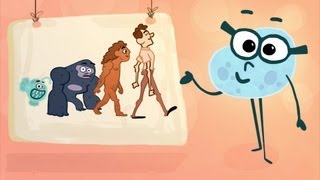(单词翻译:单击)
Myths and misconceptions about evolution. Let's talk about evolution.
对于进化论的迷思与误解。让我们谈谈进化。
You've probably heard that some people consider it controversial, even though most scientists don't.
你可能听说,有些人认为它具争议性,虽然多数科学家不这么认为。
But even if you aren't one of those people and you think you have a pretty good understanding of evolution,
即使你不是反对人士之一,并且认为自己相当理解进化的概念
chances are you still believe some things about it that aren't entirely right,
你可能依旧相信着一些不完全正确的想法,
things like, "Evolution is organisms adapting to their environment."
比如“进化意味着生物适应其环境”,
This was an earlier, now discredited, theory of evolution.
这是一个旧想法,现在却成了早已被推翻了的进化理论。
Almost 60 years before Darwin published his book,
就在达尔文发表其伟大的著作的60年前,
Jean-Baptiste Lamarck proposed that creatures evolve by developing certain traits over their lifetimes
让-巴蒂斯特·拉马克指出了生物在一生中形成的各种特征
and then passing those on to their offspring.
并且将它们传给后代的现象叫做进化。
For example, he thought that because giraffes spent their lives stretching to reach leaves on higher branches,
就像,他认为由于长颈鹿终其一生都在拉伸自己的颈子吃树梢上的叶子,
their children would be born with longer necks.
它们的后裔便因此有了更长的脖子。
But we know now that's not how genetic inheritance works.
但现在我们知道基因遗传并非如此。
In fact, individual organisms don't evolve at all.
事实上,生物本身不会进化。
Instead, random genetic mutations cause some giraffes to be born with longer necks,
是随机的基因突变使得有些长颈鹿生来便有更长的脖颈,
and that gives them a better chance to survive than the ones who weren't so lucky, which brings us to "survival of the fittest".
这使它们的生存几率比那些不幸没有长“长脖子”的高了许多,这将我们引领到“适者生存”的概念。
This makes it sound like evolution always favors the biggest, strongest, or fastest creatures, which is not really the case.
这听起来就好像进化总是偏好最硕大、最强壮或速度最快的动物,但事实并非如此。
For one thing, evolutionary fitness is just a matter of how well-suited they are to their current environment.
首先,进化的适存度仅仅反映了生物是否适合当下的环境。
If all the tall trees suddenly died out and only short grass was left,
如果所有的树木瞬间消失,只剩下青草地,
all those long-necked giraffes would be at a disadvantage.
那么所有的长颈鹿都将处于不利的位置。
Secondly, survival is not how evolution occurs, reproduction is.
第二,进化的延续仰赖的不是生存,而是繁殖。
And the world if full of creatures like the male anglerfish,
世上物种何其多,比如雄性的安康鱼,
which is so small and ill-suited for survival at birth that it has to quickly find a mate before it dies.
它们刚出生时又小又不适存活,必须迅速于死亡前寻找到配偶。

But at least we can say that if an organism dies without reproducing, it's evolutionarily useless, right?
这样我们便可以说,如果有一物种没繁衍就死亡,那它在进化上就没什么用了是吧?
Wrong! Remember, natural selection happens not at the organism level, but at the genetic level,
大错特错!请记住,自然的选择并不针对某些物种的个体,而是针对基因的层面。
and the same gene that exists in one organism will also exist in its relatives.
存在于某一个个体的基因,也会存在于其亲属身上。
So, a gene that makes an animal altruistically sacrifice itself to help the survival and future reproduction of its siblings or cousins,
所以让生物牺牲自我来帮助后代生存或生殖的基因,
can become more widespread than one that is solely concerned with self-preservation.
其繁衍的数目可以大过于仅仅在乎保存自我的基因。
Anything that lets more copies of the gene pass on to the next generation will serve its purpose, except evolutionary purpose.
任何能使更多基因复制并传给后代的机制都可以达到这个目的,除了进化的目的。
One of the most difficult things to keep in mind about evolution is that when we say things like,
关于进化论的一个最困难的概念就是,当我们说
"Genes want to make more copies of themselves," or even, "natural selection," we're actually using metaphors.
“基因想要增加自己的数量”或甚至“自然的选择”,这些其实都只是比喻罢了。
A gene doesn't want anything, and there's no outside mechanism that selects which genes are best to preserve.
基因其实不愿做任何事,也并不存在一种外部机制来选择哪些基因最适合保存。
All that happens is that random genetic mutations cause the organisms carrying them to behave or develop in different ways.
真正所发生的是,随机的基因突变会使生物个体产生不同的行为或发展。
Some of those ways result in more copies of the mutated gene being passed on, and so forth.
而其中,有些行为最后使得某些突变的基因被传到下一代,仅此而已。
Nor is there any predetermined plan progressing towards an ideal form.
并不存在一个使物种进化趋于完美的计划。
It's not ideal for the human eye to have a blind spot where the optic nerve exits the retina,
比如:人的视觉神经与视网膜的接触点会产生不完美的盲点,
but that's how it developed, starting from a simple photoreceptor cell.
但是人眼就是这样的,它从一个简单的感光细胞发展而来。
In retrospect, it would have been much more advantageous for humans to crave nutrients and vitamins rather than just calories.
回顾以往,人类如果能着重营养和维生素的摄取,而不单单只摄取热量的话,那该有多好。
But over the millenia, during which our ancestors evolved, calories were scarce,
但是我们祖先在这几百万年来的进化过程中热量是很难取得的,
and there was nothing to anticipate that this would later change so quickly.
而且没有任何人能预料情况转变地如此迅速。
So, evolution proceeds blindly, step by step by step, creating all of the diversity we see in the natural world.
所以进化的过程是盲目的,它一步接着一步,创造出我们至今所见到的多样化自然界。


